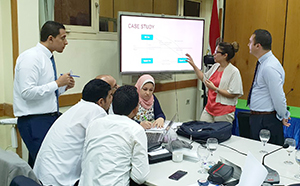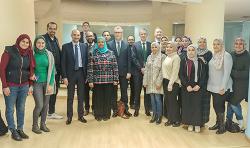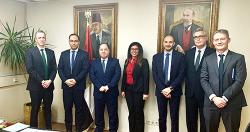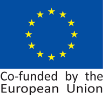TIWB Egypt
Strengthening tax transparency and exchange of information in Egypt
21 April 2020
|
Building on the work already undertaken by Egypt and the OECD-hosted Global Forum on Transparency and Exchange of Information for Tax Purposes (Global Forum), the Egyptian Tax Authority (ETA) launched a new Tax Inspectors Without Borders (TIWB) programme in January 2020 to strengthen capacity to effectively exchange information with other global tax jurisdictions. |
|
Through this new programme, implemented in co-operation with the United Kingdom and partly funded by the European Union (EU) and United Kingdom, the HM Revenue and Customs (UK HMRC) is providing experts to undertake a series of on-site visits to provide hands on support to ETA, as well as remote assistance when necessary. A first visit took place from 12-16 January 2020, whereby UK HMRC and Global Forum officials provided a workshop on exchange of information for 20 Egyptian tax officials. At the inaugural launch on 15 January 2020, H.E. Dr. Mohamed MAAIT, Minister of Finance, reiterated Egypt’s commitment to implement the tax transparency standards and welcomed the new TIWB programme. |
ETA, Global Forum and HMRC officials |
|
OECD, Global Forum and HMRC officials with H.E. Mohamed Maait - Minister of Finance (third from left) |
Egypt has previously benefited from TIWB assistance on transfer pricing audit since 2017, which has enhanced their tax auditors’ technical knowledge to audit multinational enterprises, leading to additional revenues. In 2019, Egypt requested two new programmes, an advanced transfer pricing programme, as well as this new programme focused on exchange of information. The Global Forum Secretariat is also assisting Egypt prepare for its peer review assessing its compliance with the international standard of exchange of information on request (EOIR). This review includes the assessment of availability of and access to beneficial ownership information. The Global Forum aims to ensure that all jurisdictions adhere to the same high standard of tax transparency and exchange of information. This is done through a robust monitoring and peer review process, as well as by providing technical assistance to member countries. |
|
This TIWB EOI programme complements the technical assistance programme funded by the EU, and is being delivered by the Global Forum Secretariat to help the ETA implement the international standard of EOIR in practice and benefit from tax transparency and international tax co-operation to tackle tax evasion and other illicit financial flows. |
TIWB supporting Egypt's Vision 2030
By May Abo Ghally, OECD Tax Advisor
18 December 2018
 |
Since January 2018, a TIWB programme has supported 20 Egyptian Tax Administration (ETA) auditors from both the Transfer Pricing (TP) and Large Taxpayers (LTP) team in reviewing Egyptian TP audit cases, as well as a potential Advanced Pricing Agreement (APA) case. One of the TP audit cases has now been finalised with a TP adjustment amounting to EGP 66.6m (USD 3.7m) and tax due amounting to EGP 16.6m (USD 932k). This case represents Egypt’s first TP audit case that has a stand-alone TP audit report incorporating a full TP analysis of the taxpayer’s controlled transactions under audit, to be included as part of the Corporate Income Tax audit report. This is indeed a great milestone for ETA and the TIWB programme. I have had the privilege of working on the programme as an Arabic-speaking tax expert who brings relevant regional and cultural dynamic to support the lead TIWB expert during his missions. My presence as the local expert resulted in an increased level of interaction and confidence of the ETA auditors, being able to communicate their concerns and questions in Arabic. |
|
TIWB assistance has had an impact at multiple levels. Firstly, skills transfer and organisational capacity building have improved. There has been noticeable progress in terms of ETA TP auditors’ ability to critically analyse taxpayers’ TP documentation, use TP methodologies, perform comparable searches, ask relevant questions and conduct TP audits with strong technical arguments and a results-oriented approach. TIWB assistance has helped build TP auditors’ confidence when collaborating with other ETA teams and discussing with local taxpayers, while at the same time, creating a better understanding of risk assessment, audit strategies and techniques within ETA. The remote assistance provided in-between missions by the TIWB experts has also helped create an open dialogue with ETA auditors to advance on the preceding mission’s action points and deliver better results. |
|
Secondly, a change in mind-sets has occurred. Following the issuance of 2010 TP guidelines, initial communication with large taxpayers was strained due to relative unpopularity of TP with the Egyptian taxpayer population. However, due to improved technical capacity of ETA through TIWB, this communication has improved significantly and there has been a noticeable shift in the taxpayers’ attitudes, resulting in an improved response rate to the TP audit-related requests.
Thirdly, ETA has improved its knowledge management through a tailored and user-friendly TP Audit Manual, which was created during the TIWB programme. The TP Audit Manual is a living document for the TP team used as reference tool for audits and risk assessment processes. |
- R. Angel - TIWB Expert |
|
The TIWB programme in Egypt is progressively popular, as more auditors from the ETA LTP team are keen to attend workshops and share their audit files with the TP team. This has forged greater collaboration across ETA. The TIWB-ETA partnership is bringing greater certainty and potentially more revenues to Egypt through greater co-operation and increased taxpayer confidence.
Taxation has long been a part of Egyptian civilisation. The first known system of taxation appeared in Ancient Egypt around 3000 - 2800 BC during the First Dynasty of the Old Kingdom of Egypt. Taxation remains a key component of Egypt’s revenues to date, presenting 70.4% of the budget for the fiscal year 2017-2018.
In 2011, post-revolution and following a period of instability, the Egyptian government embarked on an ambitious reform agenda “Egypt Vision 2030” to achieve sustainable development and improve Egyptians’ quality of life. Strengthening the tax system in Egypt is a core element of this Vision. Furthering this cause, in 2016, the Egyptian Ministry of Finance (EMOF) launched its “Vision 2022” to set stable, short and long-term tax policies in order to achieve the economic, fiscal and social objectives of tax, and raise Egypt’s current tax-to-GDP ratio of 14.6% to 19% by 2022. |
 |
|
|
The same year, Egypt became an active member of the OECD’s Inclusive Framework on Base Erosion and Profit Shifting (BEPS), working together on an equal footing with other members to develop and implement solutions to problems arising from gaps and mismatches in the international tax rules, sometimes leading to tax avoidance strategies adopted by multinational enterprises (MNEs). To support the implementation of the BEPS minimum standards, EMOF updated its Transfer Pricing (TP) guidelines and with OECD’s capacity building assistance developed the ETA TP practice. However, the need to apply these guidelines and for hands-on assistance to effectively audit MNEs led to a request for support under the TIWB initiative. The UNDP and European Union co-fund the TIWB programme in Egypt. |
|
» Return to Reports & Case Studies
Related Documents




